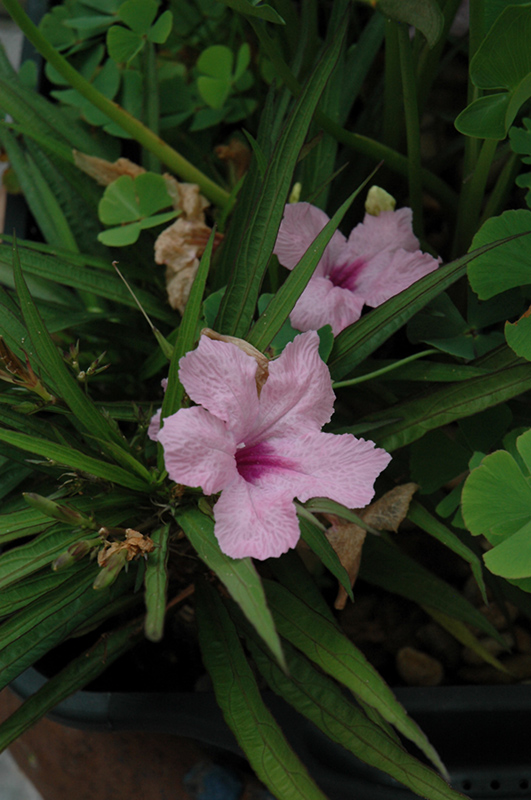Pink Mexican Petunia
Ruellia brittoniana 'Pink'
Height: 3 feet
Spacing: 18 inches
Sunlight:
![]()
![]()
Hardiness Zone: 7b
Other Names: Ruellia simplex, Chi Chi, Wild Petunia,
Description:
This variety is quite adaptable, tolerating average to wet conditions in any kind of soil; abundant pink flowers all season long; cut back stems to encourage re-blooming; does not set seed but will spread by rhizomes; beautiful when massed in borders
Ornamental Features
Pink Mexican Petunia features showy pink trumpet-shaped flowers at the ends of the stems from late winter to mid fall. Its narrow leaves are dark green in color. The foliage often turns burgundy in fall.
Landscape Attributes
Pink Mexican Petunia is an herbaceous evergreen perennial with an upright spreading habit of growth. Its medium texture blends into the garden, but can always be balanced by a couple of finer or coarser plants for an effective composition.
This plant will require occasional maintenance and upkeep. Trim off the flower heads after they fade and die to encourage more blooms late into the season. It is a good choice for attracting bees and butterflies to your yard. Gardeners should be aware of the following characteristic(s) that may warrant special consideration;
- Spreading
Pink Mexican Petunia is recommended for the following landscape applications;
- Mass Planting
- General Garden Use
- Container Planting
- Bog Gardens
Planting & Growing
Pink Mexican Petunia will grow to be about 3 feet tall at maturity, with a spread of 24 inches. When grown in masses or used as a bedding plant, individual plants should be spaced approximately 18 inches apart. It grows at a fast rate, and under ideal conditions can be expected to live for approximately 10 years. As an evegreen perennial, this plant will typically keep its form and foliage year-round.
This plant does best in full sun to partial shade. It is quite adaptable, prefering to grow in average to wet conditions, and will even tolerate some standing water. It may require supplemental watering during periods of drought or extended heat. It is not particular as to soil type or pH, and is able to handle environmental salt. It is highly tolerant of urban pollution and will even thrive in inner city environments. Consider applying a thick mulch around the root zone in winter to protect it in exposed locations or colder microclimates. This is a selected variety of a species not originally from North America. It can be propagated by division; however, as a cultivated variety, be aware that it may be subject to certain restrictions or prohibitions on propagation.
Pink Mexican Petunia is a fine choice for the garden, but it is also a good selection for planting in outdoor pots and containers. With its upright habit of growth, it is best suited for use as a 'thriller' in the 'spiller-thriller-filler' container combination; plant it near the center of the pot, surrounded by smaller plants and those that spill over the edges. It is even sizeable enough that it can be grown alone in a suitable container. Note that when growing plants in outdoor containers and baskets, they may require more frequent waterings than they would in the yard or garden.
Disclaimer - This Plant Finder tool is an online resource representing many of the varieties that we carry over the course of the season, and is intended for informational purposes only. Inventory varies seasonally, so we cannot guarantee that every plant will be in stock at all times - please contact the store directly for current availability. It does not include our entire selection of plants, so be sure to visit our store to see varieties that may not be represented on this list.

